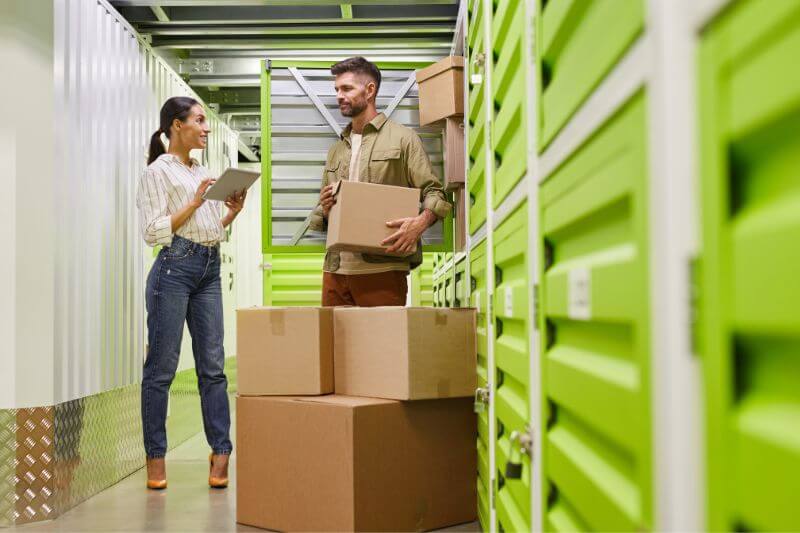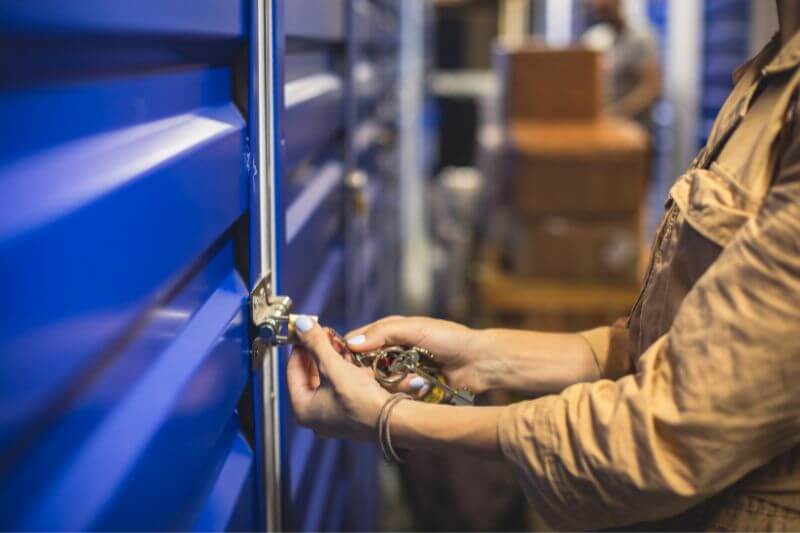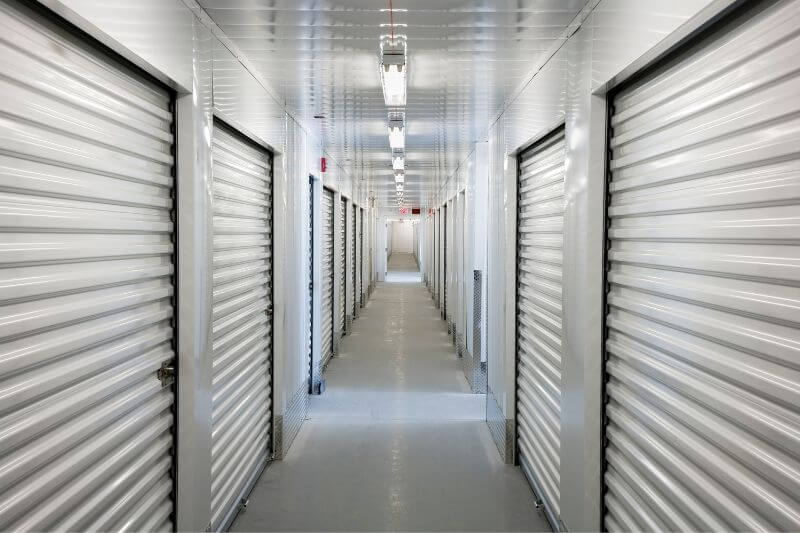What are the common self-storage mistakes to avoid? You’re excited about loading up the storage unit you reserved with all your things. They are great locations to keep your belongings while you move, organize your home, create extra space, or operate a business. Tossing everything in, shutting the door, and leaving when storing your belongings will be tempting.
Self-storage has many advantages, but only when you store items properly. Like most things, moving, packing, and storing items needs considerable thought and preparation. Being unprepared is a rookie error. To make the most of your space, check out these common self-storage mistakes to avoid and also some storage unit organization tips.
What Can And Cannot Be Stored In Your Self-Storage?
You must first understand what belongs in storage and what doesn’t. Proper storage practices can help you stay safe and healthy and facilitate efficient organization.
Most of the items on this broad list of things that you can and can’t store in a self-storage unit are pretty obvious:

What You Can
Appliances
Freezers, washers, dryers, microwaves, stoves, and refrigerators are included. Appliances can be kept in storage for as long as they are cleaned and allowed to dry out beforehand, and they should never be left plugged in. Toasters, vacuum cleaners, and coffee makers are examples of smaller appliances that are fine if no dried-on drips or crumbs are on them.
Business Files
Businesses are increasingly using self-storage for offsite storage and relocation. Additionally, the cost for each square foot is significantly less than that of an office building or a warehouse, so it would only take up a little of the business’s budget. For small business owners like realtors, caterers, house stagers, and organizers, self-storage is also a great option.
Electronics
While many people rely on electronics to run their daily lives, electronics like computers, printers, TVs, speakers, and audio systems occasionally need storage. Considering the potential cost of these items, ensuring you have a secure place to store them is essential. Storing things in a climate-controlled storage unit is also advised for optimal safety. Remove your equipment’s batteries, inkjet cartridges, CDs, and DVDs before putting them away. These are things that, in time, could corrode or become stuck.
Household Goods
The most popular things in self-storage facilities are furniture, toys, food, toiletries, books, clothing, etc. It also includes antiques, collectibles, and keepsakes. Climate-controlled storage is the best choice for items since it controls humidity and temperature to preserve the value of your possessions.
Seasonal Items
Seasonal products and self-storage go hand in hand. Everything from camping gear to Christmas decorations is something we will always need or require throughout particular times of the year. Remember that apparel and winter accessories are also considered seasonal products. And an excellent place to store them all is in a storage container.
What You Cannot
Hazardous Materials
The list may be extensive and intricate, but everything combustible or explosive is beyond limits. Examples include paint, aerosols, chemicals, propane, oil, grease, and gasoline.
- Leave the paint thinner or mineral spirits out if you keep art supplies.
- Remove aerosol sprays, such as hairspray and cooking spray, and nail polish removers from any bathroom or kitchen products you store.
- Remove the fertilizer and weed killer from any gardening supplies you may keep in storage.
- Empty the gasoline and oil from your lawn equipment before storing it.
Ensure non-hazardous substances, including non-toxic paint or beauty products, are stored in airtight receptacles or bags to prevent spills or leaks. Aside from that, get rid of any undesirable dangerous materials. Find out how by contacting your local waste management company.
Living Things
People, plants, and animals are examples of living things. We’ve heard some strange tales of people who essentially turned self-storage facilities into homes for themselves and their pets. Simply put, storage units are unfit for human habitation. Numerous local and federal housing laws forbid such actions, and breaking them could result in criminal penalties. The same is true with plants. Not only will they die, but the soil will retain moisture and cause bugs, mold, and mildew.
Perishable Goods
If the food needs to be refrigerated, it is perishable. Never store produce, dairy, and meat in self-storage. However, as long as they remain in sealed containers, non-perishable items are usually okay.
However, bear in mind that there are a few exceptions. Pet food, rice, other grains, boxed goods, powdered milk, flour, and non-perishable items—even freeze-dried or dehydrated—can all develop rancid, smell awful, and draw pests.
Check the expiration dates on any canned food (tinned or those in glass canning jars) and look for any broken containers that can let moisture or bacteria in.
Wet or Scented Items
It’s common knowledge that you shouldn’t store things that are damp or have strong odors, but these things should be avoided. Your storage container may become infected with mold and mildew due to moisture. Thus, before keeping them, make sure they are dry. Take a few extra towels with you if you’re moving on a damp, rainy day so you can use them to dry off any moist items before returning the damp towels home. Don’t just put them in the corner of a storage unit!
Scented potpourri, candles, and other fragrances attract rodents and unwanted pests. Once they’ve gotten inside your storage area, they might cause damage to your belongings by tearing apart furniture, wiring, and anything else their sharp teeth can destroy.
11 Self-Storage Mistakes You Should Avoid
Take time and extra care to avoid these self storage mistakes when renting a Scottsdale self-storage facility to prevent receiving damaged goods or having a bad experience.
Using the Wrong Box Size
When packing in a storage unit, one of the most common mistakes homeowners make is using boxes of varying sizes. Recycling used fruit or liquor boxes is a great concept, but when stacking or organizing them, it can be challenging to create uniformity and consistency. Instead of going through the hassle of sorting things out, utilize the specially designed moving boxes available in three sizes: small, medium, and large. It saves you time and helps stack the boxes much more.
Using Newspaper as a Wrapper
Newspaper ink, even with the best of intentions, can smear and bleed across your things, particularly if you don’t store them in a space with climate control. Unpacking filthy possessions—some of which might be permanently damaged or tarnished—will be your duty. Using bubble wrap or paper without ink is better; even an inexpensive roll of butcher’s paper works better.
Using Cardboard Boxes or Plastic Bags
Using cardboard boxes or plastic bags is not a good idea because your belongings are hardly protected by plastic bags, and cardboard boxes might attract pests and moisture. Use plastic bins in place of either one of these. These offer superior protection for your things because they are robust and do not quickly become wet.
Not Packing Correctly
Although there isn’t a single ideal process to set up a storage unit, systematic planning and packaging of various items helps to ensure that your storage space is used effectively.
Plates, platters, fine china, and picture frames should all be wrapped in bubble wrap and nested between two thin cardboard pieces. This padding keeps the objects from shattering during shipping. Food needs to be packaged individually in sealed containers. Disassembling furniture is a good idea. Packing peanuts and cushioning can be used to safeguard bigger, heavier items.
When filling your storage unit to its brim, leave room for access to all your stuff. Always place the heaviest and most durable goods at the bottom of the container, and arrange household items you expect to use frequently up front.
Moving Excessively Heavy Boxes
Another common mistake most individuals make is storing bulky items in a single box. It puts the box’s stability in danger and makes it harder to transport. How often have you witnessed someone hoist a big box just to have the contents start to fall out the bottom? To prevent this, split up bulky stuff into multiple moving boxes, keeping each box weighing no more than forty pounds.
Not Giving Enough Time
Putting everything off till the last minute is one of the most awful things you can do when moving. You’ll be more likely to drop boxes quickly, break or crush your stuff, and get hurt. You could fall behind schedule as a result of this. Haste makes waste, as they say, and when it involves packing, this is undoubtedly true. Plan the move and do yourself a favor. Give yourself ample time to set up your storage facility and employ professional movers to help with the labor-intensive lifting.
Not Labeling Your Boxes
Sorting through boxes without labels in a self-storage facility is similar to trying to locate a needle within a haystack. Knowing where to put each box as you unpack will be helpful to both you and the moving company, even if you want to go back and fully unpack your storage unit.
Make a list of everything you intend to store in the storage space. To help you find what to look for, label the boxes. Knowing the contents of your mini-storage unit or locker is also advantageous for insurance.
Choosing Incorrect Storage Unit Size
Choosing the right storage unit size is crucial. First-time renters often find it challenging to estimate the exact size of units they require. Even if smaller units can be less expensive, it’s never smart to load as much as possible into a tiny space. Even if you can save money now, you face the danger of long-term damage to your things. Use a storage calculator if you need help determining what size unit fits you the best. It can assist you in visualizing the possible contents of each storage container size.
Neglecting To Clean Before Storing
Maintaining the condition of what you have requires regular maintenance. Uncleaned containers can cause quick decomposition, bug infestation, mold growth, and hazardous bacteria. It may begin with one item and spread to the rest of your possessions. All that needs to be done is dust them and quickly wipe them down.

Failing to Inspect Storage Security Features
Choosing storage space is an important decision that many people overlook. It’s simple to assume that nothing will happen to your belongings as long as they are shut inside the compound of the storage facility. Never undervalue security.
Carefully consider the safety features of a storage unit. While storage management ensures your items are safe, learning to keep things secure in a storage unit and voice any concerns is a good idea. Ask about your concerns; after all, the safety of the things you have is essential.
Storing Prohibited Items
Investing in storage containers will help you organize your home, but some things are just not suitable for them. It covers flammable items, food, pets, and plants. Contact the facility manager if you have questions about what you can and cannot store in a storage unit.
Conclusion
Remember these storage tips to ensure that self-storage is easy and successful. It is the moment to make the necessary corrections if you have a storage unit in Scottsdale and end up making any of these errors. It will assist you in keeping your unit organized as well as help you maintain the integrity of all your things.
Are you trying to find a self-storage unit in Scottsdale? McDowell Mountain Community Storage has safe and climate-controlled self-storage units in various sizes—call (602) 899-5484 to accommodate your space needs to reserve yours right away.


